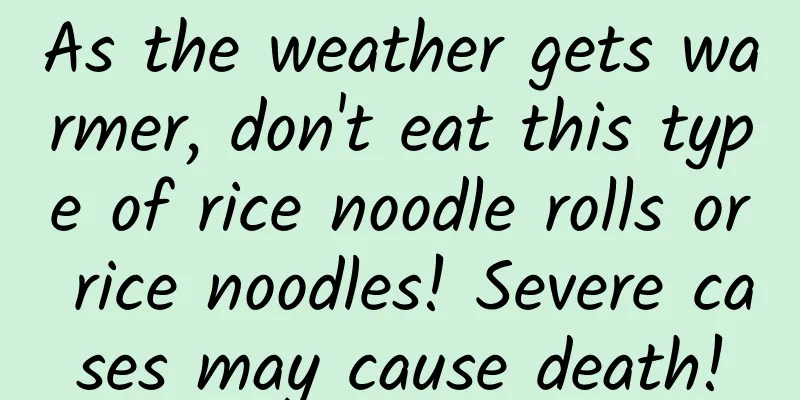As the weather gets warmer, don't eat this type of rice noodle rolls or rice noodles! Severe cases may cause death!

|
Be careful when eating wet rice noodles recently You may accidentally get sick from eating Cause poisoning Why does eating wet rice noodles cause poisoning? What should I pay attention to when purchasing and storing? What other foods should we be cautious about eating? Let’s take a look together! 01 Be careful when eating wet rice noodles recently! Become a trending search! Recently, the topic of "be careful about eating wet rice noodles" has become a hot search topic. It is understood that wet rice noodles include river noodles, rice noodle rolls (rolled rice noodles), Chencun rice noodles, rice noodles, rice noodles (rice vermicelli), rice noodles, cold noodles, etc. The Guangdong Provincial Market Supervision Administration issued a reminder: The shelf life of wet rice noodles is generally 24 hours. Please do not eat them after the shelf life has expired. The "Shenzhen Food and Drug Safety Office" also issued a reminder: In the near future, do not eat such wet rice noodles, black fungus, white fungus, etc.! Some netizens said: I put the noodles in the refrigerator for three days and continued to eat them... Some netizens also said, "Thank you for the reminder, pay attention to food safety and don't eat this kind of rice noodle rolls and rice noodles" and "I have forwarded it to the Loving Family group." 02 Expired wet rice noodles Why is it poisonous? How poisonous is it? Recently, the weather in many areas has been hot and humid, which is the active period of Pseudomonas cereus. Rice noodle rolls, rice noodles, cold noodles and other wet rice noodles are easily contaminated by Pseudomonas cereus in hot and humid weather, and produce fumonisin. The risk of fumonisin poisoning is extremely high, with a mortality rate of up to 40%-100%. Expired wet rice noodles may have been contaminated with Pseudomonas cereus, which in turn produces aflatoxin, greatly increasing the risk of poisoning after consumption. Fumonisic acid is a small molecule fatty acid with strong heat resistance. Even if it is boiled in 100℃ water or steamed in a pressure cooker, its toxicity cannot be destroyed . It can cause poisoning after eating and damage important organs such as the liver, kidneys, heart, and brain. At present, there is no specific antidote for fumonisic acid. Food safety experts remind: " The incubation period of poisoning caused by fumonisin toxin is generally 30 minutes to 12 hours , and in a few cases it is 1 to 2 days. **The main symptoms are upper abdominal discomfort, nausea, vomiting, mild diarrhea, dizziness, and general weakness. **Severe cases may cause jaundice, subcutaneous hemorrhage, vomiting, unconsciousness, convulsions, convulsions, shock and even death, usually without fever. If suspected poisoning occurs, stop eating the suspected food immediately, induce vomiting as soon as possible, and expel the stomach contents to reduce the absorption of toxins and damage to the body, and send to the hospital for treatment in time and symptomatic treatment." 03 What should you pay attention to when purchasing and storing? How to stay away from fumonisin poisoning? If you are not careful when eating wet rice noodles and other products, it may cause orzoic acid poisoning, leading to serious consequences. So, what should we pay attention to when purchasing and storing wet rice noodles?
1. When purchasing wet rice noodle products, you should choose regular channels to purchase. Before purchasing, you should carefully read the product label instructions and pay attention to the product's sensory properties and shelf life.
1. In terms of storage, avoid storing starchy ingredients for a long time, especially in a hot and humid environment. Keep the food sealed and the storage environment clean and dry. Check the shelf life of ingredients regularly and discard expired ingredients resolutely. Do not eat black fungus that has been soaked overnight; Buy fresh ingredients with recent production dates; When buying food, try to choose small packages and do not hoard food; Choose a cool, dry, ventilated environment to store food, and avoid direct sunlight; Moldy food should be disposed of promptly and never be consumed after washing or removing the moldy parts. 04 Spring Be careful when eating these! It is spring, and it is the right time for an outing. In addition to not eating wet rice noodles that have exceeded their shelf life, the editor also reminds everyone: do not pick, sell, process, or eat wild mushrooms, Chinese medicinal materials, pufferfish, etc. of unknown origin.
Some wild poisonous mushrooms look similar to edible mushrooms. Identification requires professional knowledge and the use of certain instruments and equipment. It is difficult to distinguish them only by the naked eye and by appearance characteristics such as shape, smell, and color. It is very easy to eat them by mistake and cause poisoning. How to prevent it? First, do not pick them; second, do not buy them; third, do not eat them.
Gelsemium elegans is a plant that is often mistaken for a traditional Chinese medicine. The whole plant is highly poisonous, and the main toxic substance is the alkaloids of Gelsemium elegans. Ingestion can cause breathing difficulties at the mildest, or even death at the worst. Gelsemium elegans is commonly found in grass or bushes beside villages, roadsides, and hillsides. It grows like a creeping vine, and its roots buried in the soil are well-developed, often entwined with other plants around it. **The shapes of its flowers and rhizomes are very similar to some commonly used medicinal materials such as "Five-Fingered Peach", "Honeysuckle", "Golden Key", etc. **Poisoning caused by mistakenly digging the roots of Gelsemium elegans or mixing the roots of Gelsemium elegans with them for soaking medicinal wine or making soup for drinking, similar poisoning cases occur from time to time. Therefore, do not consume Chinese medicinal materials of unknown origin. Before making homemade medicinal wine or boiling soup with Chinese medicinal materials, you must learn about the relevant medicinal materials in detail and purchase them from formal channels.
Puffer fish, because it contains tetrodotoxin, can easily lead to poisoning after eating, resulting in nerve paralysis, dizziness, vomiting, numbness of lips and fingers, general weakness and other symptoms, which are life-threatening in severe cases. There is currently no effective antidote or treatment. The legally farmed edible puffer fish available on the market are not live fish , but fish skin or fish meat products after slaughter. All puffer fish on the market have a traceable QR code on their outer packaging. Consumers are reminded not to buy, catch or eat wild puffer fish, and not to buy or eat whole puffer fish or puffer fish products processed by companies that have not been approved by the state. Source: Nongshi.com, Nanfang News, CCTV News, Fuzhou Daily, CNR, Yangcheng News Editor/Yang Yue (Intern) Editor/Zhang Wen |
<<: Drug treatment for Parkinson's disease
>>: How to relieve "spring fatigue"
Recommend
Why do women get acne?
In life, we can find that many female friends lik...
Apple's retail store operating secrets to maintain sales
There was an article about Apple retail stores th...
Can postpartum depression heal itself?
After a woman gives birth, the hormones in her bo...
Subverting cognition, can dementia be transmitted from person to person? It is really unexpected that it can spread in this way
Alzheimer's disease is a serious neurodegener...
What is the best oil to use for boiled fish? What is the detailed method of boiled fish?
Modern people like to eat boiled fish very much. ...
What are the prenatal checkups that pregnant mothers must do?
Prenatal examination is an important measure to e...
When there is leucorrhea, is it the ovulation period?
Leucorrhea is a normal secretion of women. Becaus...
What can't pregnant women with high blood sugar eat?
Hyperglycemia is a condition that we often experi...
35 weeks pregnant stomach pain
When you are 35 weeks pregnant, if you feel any d...
What is the difference between children's toothpaste and adult toothpaste? Can children use adult toothpaste?
Toothpaste is one of the essential products for o...
What snacks should women drink red wine with?
Red wine can promote blood circulation. From the ...
What causes swollen labia?
Women's genitals are quite fragile. Not only ...
What to do if you have a wind-heat cold during breastfeeding
The disease of wind-heat cold is most common in w...









